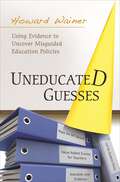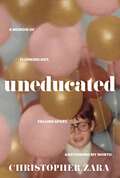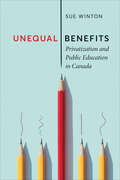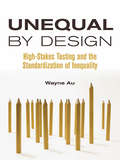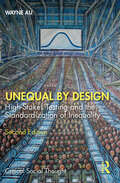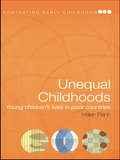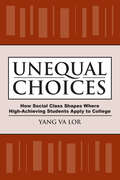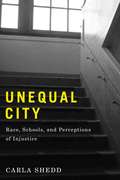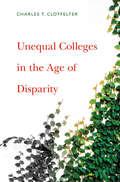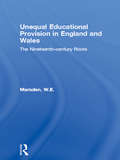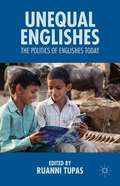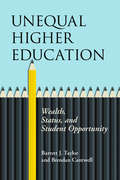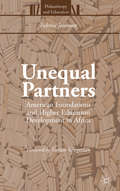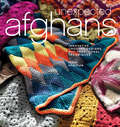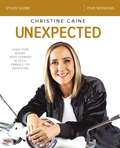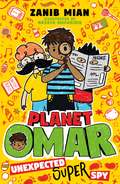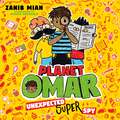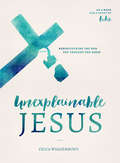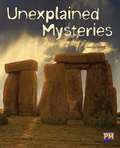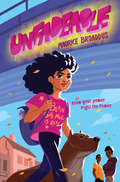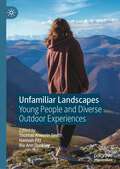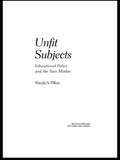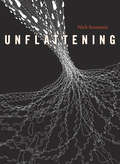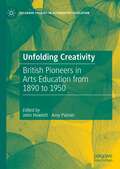- Table View
- List View
Uneducated Guesses: Using Evidence to Uncover Misguided Education Policies
by Howard WainerWhat statistical evidence shows us about our misguided educational policiesUneducated Guesses challenges everything our policymakers thought they knew about education and education reform, from how to close the achievement gap in public schools to admission standards for top universities. In this explosive book, Howard Wainer uses statistical evidence to show why some of the most widely held beliefs in education today—and the policies that have resulted—are wrong. He shows why colleges that make the SAT optional for applicants end up with underperforming students and inflated national rankings, and why the push to substitute achievement tests for aptitude tests makes no sense. Wainer challenges the thinking behind the enormous rise of advanced placement courses in high schools, and demonstrates why assessing teachers based on how well their students perform on tests—a central pillar of recent education reforms—is woefully misguided. He explains why college rankings are often lacking in hard evidence, why essay questions on tests disadvantage women, why the most grievous errors in education testing are not made by testing organizations—and much more.No one concerned about seeing our children achieve their full potential can afford to ignore this book. With forceful storytelling, wry insight, and a wealth of real-world examples, Uneducated Guesses exposes today's educational policies to the light of empirical evidence, and offers solutions for fairer and more viable future policies.
Uneducated: A Memoir of Flunking Out, Falling Apart, and Finding My Worth
by Christopher ZaraIn this &“hilarious and heartbreaking...must-read memoir&” (Publishers Weekly), Christopher Zara breaks down his winding journey from dropout to journalist and the impact that his background had in the world of privilege. Boldly honest, wryly funny, and utterly open-hearted, Uneducated is one diploma-less journalist&’s map of our growing educational divide and, ultimately, a challenge: in our credential-obsessed world, what is the true value of a college degree? For Christopher Zara, this is the professional minefield he has had to navigate since the day he was kicked out of his New Jersey high school for behavioral problems and never allowed back. From a school for &“troubled kids,&” to wrestling with his identity in the burgeoning punk scene of the 1980s; from a stint as an ice cream scooper as he got clean in Florida, to an unpaid internship in New York in his thirties, Zara spent years contending with skeptical hiring managers and his own impostor syndrome before breaking into the world of journalism—only to be met by an industry preoccupied with pedigree. As he navigated the world of the elite and saw the realities of the education gap firsthand, Zara realized he needed to confront the label he had been quietly holding in: what it looked like to be part of the &“working class&”—whatever that meant.Book Riot's Eight New Nonfiction Books to Read in May Book Browse's Best Books of May 2023
Unequal Benefits: Privatization and Public Education in Canada (UTP Insights)
by Sue WintonDrawing on research from across Canada and beyond, education policy expert Sue Winton critically analyzes policies encouraging the privatization of public education in Canada. These policies, including school choice, fundraising, fees, and international education, encourages parents and others in the private sector to take on responsibilities for education formerly provided by governments with devastating consequences for the democratic goals of public education. Unequal Benefits introduces traditional and critical approaches to policy research and explains how to conduct a critical policy analysis. Winton explains the role policy plays in supporting and challenging inequality in the pursuit of a strong democracy and the public school ideal. In these idealized education spaces, policy decisions prioritize collective needs over private interests, which are made in public by democratically elected officials, and, more importantly, every child is able to access high quality education programs and enjoy their benefits at no cost. Written for parents, educators, policymakers, and other interested citizens, Unequal Benefits sheds light on how to participate in efforts to resist educational privatization and achieve the public school ideal across Canada.
Unequal By Design: High-Stakes Testing and the Standardization of Inequality (Critical Social Thought)
by Wayne AuUnequal By Design critically examines high-stakes standardized testing in order to illuminate what is really at stake for students, teachers, and communities negatively affected by such testing. This thoughtful analysis traces standardized testing’s origins in the Eugenics and Social Efficiency movements of the late 19th and early 20th century through its current use as the central tool for national educational reform via No Child Left Behind. By exploring historical, social, economic, and educational aspects of testing, author Wayne Au demonstrates that these tests are not only premised on the creation of inequality, but that their structures are inextricably intertwined with social inequalities that exist outside of schools.
Unequal By Design: High-Stakes Testing and the Standardization of Inequality (Critical Social Thought)
by Wayne AuThis new edition of Unequal By Design: High-Stakes Testing and the Standardization of Inequality critically examines the deep and enduring problems within systems of education in the U.S., in order to illuminate what is really at stake for students, teachers, and communities negatively affected by such testing. Updates to the new edition include new chapters that focus on: the role of schools and standardized testing in reproducing social, cultural, and economic inequalities; the way high-stakes testing is used to advance neoliberal, market-based educational schemes that ultimately concentrate wealth and power among elites; how standardized testing became the dominant tool within our educational systems; the numerous technical and ideological problems with using standardized tests to evaluate students, teachers, and schools; the role that high-stakes testing plays in the maintenance of white supremacy; and how school communities have resisted high-stakes testing and used better assessments of student learning. Parents, teachers, university students, and scholars will find Unequal By Design useful for gaining a broad, critical understanding of the issues surrounding our over-reliance on high-stakes, standardized testing in the U.S. through up-to-date research on testing, historical and contemporary examples of the struggles over such tests, and information about how testing has fostered the privatization of public education in the U.S.
Unequal Childhoods: Young Children's Lives in Poor Countries (Contesting Early Childhood)
by Helen PennAn expert in her field, Helen Penn discusses the inequalities between and within countries of childhood poverty and how this poverty is recognized and defined through the following case-studies: Kazakhstan - once part of the Soviet Union Swaziland - a country in Southern Africa devastated by HIV and AIDS Himalayan India Brazil - one of the world's most unequal countries. These four case studies illustrate the diversity and complexity of the responses to the attempts to globalise childhood and highlight the need to address the inequalities of childhood experience.
Unequal Choices: How Social Class Shapes Where High-Achieving Students Apply to College (The American Campus)
by Yang Va LorHigh-achieving students from socioeconomically disadvantaged backgrounds are more likely to end up at less selective institutions compared to their socioeconomically advantaged peers with similar academic qualifications. A key reason for this is that few highly able, socioeconomically disadvantaged students apply to selective institutions in the first place. In Unequal Choices, Yang Va Lor examines the college application choices of high-achieving students, looking closely at the ways the larger contexts of family, school, and community influence their decisions. For students today, contexts like high schools and college preparation programs shape the type of colleges that they deem appropriate, while family upbringing and personal experiences influence how far from home students imagine they can apply to college. Additionally, several mechanisms reinforce the reproduction of social inequality, showing how institutions and families of the middle and upper-middle class work to procure advantages by cultivating dispositions among their children for specific types of higher education opportunities.
Unequal City: Race, Schools, and Perceptions of Injustice
by Carla SheddChicago has long struggled with racial residential segregation, high rates of poverty, and deepening class stratification, and it can be a challenging place for adolescents to grow up. Unequal City examines the ways in which Chicago’s most vulnerable residents navigate their neighborhoods, life opportunities, and encounters with the law. In this pioneering analysis of the intersection of race, place, and opportunity, sociologist and criminal justice expert Carla Shedd illuminates how schools either reinforce or ameliorate the social inequalities that shape the worlds of these adolescents. Shedd draws from an array of data and in-depth interviews with Chicago youth to offer new insight into this understudied group. Focusing on four public high schools with differing student bodies, Shedd reveals how the predominantly low-income African American students at one school encounter obstacles their more affluent, white counterparts on the other side of the city do not face. Teens often travel long distances to attend school which, due to Chicago’s segregated and highly unequal neighborhoods, can involve crossing class, race, and gang lines. As Shedd explains, the disadvantaged teens who traverse these boundaries daily develop a keen “perception of injustice,” or the recognition that their economic and educational opportunities are restricted by their place in the social hierarchy. Adolescents’ worldviews are also influenced by encounters with law enforcement while traveling to school and during school hours. Shedd tracks the rise of metal detectors, surveillance cameras, and pat-downs at certain Chicago schools. Along with police procedures like stop-and-frisk, these prison-like practices lead to distrust of authority and feelings of powerlessness among the adolescents who experience mistreatment either firsthand or vicariously. Shedd finds that the racial composition of the student body profoundly shapes students’ perceptions of injustice. The more diverse a school is, the more likely its students of color will recognize whether they are subject to discriminatory treatment. By contrast, African American and Hispanic youth whose schools and neighborhoods are both highly segregated and highly policed are less likely to understand their individual and group disadvantage due to their lack of exposure to youth of differing backgrounds.
Unequal Colleges in the Age of Disparity
by Charles T. ClotfelterBased on quantitative comparisons of colleges since the 1970s, Charles Clotfelter reveals that despite the civil rights revolution, billions spent on financial aid, and the commitment of colleges to greater equality, stratification in higher education has grown starker. He explains why undergraduate education—unequal in 1970—is even more so today.
Unequal Educational Provision in England and Wales: The Nineteenth-century Roots
by W.E. MarsdenPublished in 1987, Unequal Educational Provision in England and Wales is a valuable contribution to the field of Education.
Unequal Englishes
by Ruanni TupasUnequal Englishes challenges the widely held assumption that languages and linguistic varieties are equal, and explores the various ways we can understand, examine and transform inequalities of Englishes. Written by engaging and well-known scholars of language, education and politics, the chapters in the volume offer a wide range of perspectives on the complex but interwoven relationships between inequalities and Englishes, with an expansive geopolitical trajectory which includes the Philippines, Cuba, China, Canada, India, Malaysia, the United States, Singapore and South Korea. Their specific social and ideological contexts of analyses are wide-ranging, including textbooks and classrooms; teachers, would-be teachers and students; call centers; linguistic landscapes; stories, narratives and jokes. The volume mobilizes the notion of unequal Englishes as one way to understand the global spread of English today.
Unequal Higher Education: Wealth, Status, and Student Opportunity (The American Campus)
by Brendan Cantwell Barrett J. TaylorAmerican higher education is often understood as a vehicle for social advancement. However, the institutions at which students enroll differ widely from one another. Some enjoy tremendous endowment savings and/or collect resources via research, which then offsets the funds that students contribute. Other institutions rely heavily on student tuition payments. These schools may struggle to remain solvent, and their students often bear the lion’s share of educational costs. Unequal Higher Education identifies and explains the sources of stratification that differentiate colleges and universities in the United States. Barrett J. Taylor and Brendan Cantwell use quantitative analysis to map the contours of this system. They then explain the mechanisms that sustain it and illustrate the ways in which rising institutional inequality has limited individual opportunity, especially for students of color and low-income individuals.
Unequal Partners
by Fabrice JaumontThis book offers a nuanced analysis of a US-led foundation initiative of uncommon ambition, featuring seven foundations with a shared commitment to strengthen capacity in higher education in Sub-Saharan African universities. The book examines the conditions under which philanthropy can be effective, the impasses that foundations often face, and the novel context in which philanthropy operates today. This study therefore assesses the shifting grounds on which higher education globally is positioned and the role of global philanthropy within these changing contexts. This is especially important in a moment where higher education is once again recognized as a driver of development and income growth, where knowledge economies requiring additional levels of education are displacing economies predicated on manufacturing, and in a context where higher education itself appears increasingly precarious and under dramatic pressures to adapt to new conditions.
Unexpected Afghans: Innovative Crochet Designs with Traditional Techniques
by Robyn ChachulaUnexpected Afghans presents 29 innovative interpretations of a favorite at-home essential. From best-selling author Robyn Chachula comes an in-depth look into crocheting traditional afghans using contemporary techniques, colors and patterns.Expert designers including Kristin Omdahl, Kathy Merrick, Kimberly McAlindin, and many more, provide an abundance of fresh patterns and projects that are perfect for new and advanced crocheters as they start out beginner-friendly and become more complex, allowing a crocheter to build skills and confidence. Designers at any level will enjoy: • A detailed technique's workshop in every chapter including cables, motifs, color, lace, and Tunisian crochet. • Helpful tips from designers for working through each afghan project. • Easy-to-follow charts and diagrams. Along with tons of beautiful afghan projects for all skill levels, you'll find many of your favorite designer's biographies--giving you an exploration into their inspiration.
Unexpected Study Guide: Leave Fear Behind, Move Forward in Faith, Embrace the Adventure
by Christine CaineLife is an unpredictable journey full of twists and turns. The good news is that while we don’t always know what’s going to happen, we can always trust that God uses everything in our lives as an invitation to rely on him more deeply and completely.In this five-session video Bible study, bestselling author Christine Caine shows that while most of us have been trained to fear the unexpected and want everything to be “under control,” God wants us to anticipate the unexpected with a faith-filled perspective rooted in trust. He has never been taken by surprise.We can move from a life filled with fear, control, and feeling stuck to one full of hope, faith, and trust. In an age of upheaval, we can still expect our God to be good and do good. We can trust God in the unpredictable circumstances of life by anticipating, welcoming, and even embracing the unexpected.The Unexpected Study Guide includes video discussion questions, Bible exploration, and personal study material for between sessions.Sessions include:Expect the UnexpectedUnexpected PeopleAn Unexpected AssignmentUnexpected Endings Bring New BeginningsUnexpected ResurrectionDesigned for use with the Unexpected Video Study (9780310089322) sold separately.
Unexpected Super Spy: Book 2 (Planet Omar #2)
by Zanib MianWelcome back to Planet Omar! The second book in Zanib Mian's laugh-out-loud series, with amazing cartoon-style illustrations from Nasaya Mafaridik. Perfect for fans of Tom Gates and Wimpy Kid. * Chosen asThe Times Children's Book of the Week: 'Mian's gentle mixing of humour and Muslim tradition is fresh and necessary' *Omar and his friends have been saving up their pocket money for ages so they can have the world's most epic Nerf Blaster battle. But when Omar discovers that his mosque is in trouble, they decide to donate their pennies to help save it. Then they try to raise some more money by:Doing some chores (boorrring)Selling some home-made cookies (deeelicious)Holding a talent contest (YESSSSSSS)Everything goes PERFECTLY until the money mysteriously goes missing. Can they work out who has taken it in time to stop the mosque closing down? And what exactly is Omar's sister Maryam hiding in her room...?*Zanib Mian is a World Book Day author for 2021 with her Planet Omar title, Operation Kind.*Have you read the first book in the series, Accidental Trouble Magnet? Love Reading 4 Kids called it 'irresistible reading'!
Unexpected Super Spy: Book 2 (Planet Omar #2)
by Zanib MianWelcome back to Planet Omar! The second book in Zanib Mian's laugh-out-loud series. Perfect for fans of Tom Gates and Wimpy Kid. Omar and his friends have been saving up their pocket money for ages so they can have the world's most epic Nerf Blaster battle. But when Omar discovers that his mosque is in trouble, they decide to donate their pennies to help save it. Then they try to raise some more money by:Doing some chores (boorrring)Selling some home-made cookies (deeelicious)Holding a talent contest (YESSSSSSS)Everything goes PERFECTLY until the money mysteriously goes missing. Can they work out who has taken it in time to stop the mosque closing down? And what exactly is Omar's sister Maryam hiding in her room...?(P)2020 Hodder & Stoughton Limited
Unexplainable Jesus: Rediscovering the God You Thought You Knew
by Erica WiggenhornWhen&’s the last time you were captivated by Jesus?Crowds clamored, women wept in awe, disciples dared to do the impossible—all because of Jesus. Somewhere in the overly familiar we&’ve lost our fascination. Whether you&’re worn thin, filled with questions, or desperate for more of God, come encounter Unexplainable Jesus. Experience the culture and customs of His day and follow Him into a life unimaginable. This study features:in-depth study of Luke (40 lessons over 8 weeks)historical and cultural insightssoul-searching questionsaccess to extensive online resourcesStep into the streets of Jerusalem and encounter the Jewish Rabbi who turned the world upside down. After rediscovering Jesus on the pages of the book of Luke—or maybe discovering Him for the very first time—you&’ll see there is no other plan, goal, ambition, or Person worth following but Jesus.Plus, check out the Unexplainable Jesus DVD, which contains hours of all-new video teaching content from Erica Wiggenhorn.
Unexplainable Jesus: Rediscovering the God You Thought You Knew
by Erica WiggenhornWhen&’s the last time you were captivated by Jesus?Crowds clamored, women wept in awe, disciples dared to do the impossible—all because of Jesus. Somewhere in the overly familiar we&’ve lost our fascination. Whether you&’re worn thin, filled with questions, or desperate for more of God, come encounter Unexplainable Jesus. Experience the culture and customs of His day and follow Him into a life unimaginable. This study features:in-depth study of Luke (40 lessons over 8 weeks)historical and cultural insightssoul-searching questionsaccess to extensive online resourcesStep into the streets of Jerusalem and encounter the Jewish Rabbi who turned the world upside down. After rediscovering Jesus on the pages of the book of Luke—or maybe discovering Him for the very first time—you&’ll see there is no other plan, goal, ambition, or Person worth following but Jesus.Plus, check out the Unexplainable Jesus DVD, which contains hours of all-new video teaching content from Erica Wiggenhorn.
Unexplained Mysteries (Into Reading, Level S #58)
by George IvanoffNIMAC-sourced textbook <p><p> Everyone loves a good mystery! What are UFOs and where do they come from? What strange creatures inhabit the depths of the ocean or the unexplored wilderness? What did ancient civilizations know that we don't? Why do some people go missing without a trace, and where did they go? Mysteries tap into our hidden fears and give us chills and thrills as we try to solve them. Find out about some well-known unsolved mysteries and see if these explanations are enough to satisfy you.
Unfadeable
by Maurice BroaddusPerfect for fans of Jason Reynolds and Kelly Yang, readers will love this heartfelt and genuine story about building community, finding family, and the power of Black girl magic. Bella “Unfadeable” Fades is determined to stay out of trouble. A wiser-than-her-years graffiti artist known for tagging walls and bridges in her Indianapolis neighborhood, the Land, Bella plans to spend her summer break laying low and steering clear of anyone who might tip off to social services that she’s living on her own. But keeping a low profile is all but impossible when Bella discovers people in high places are trying to defund the Land. She has to find a way to fight back.Getting involved will mean putting herself out there—making connections with unlikely friends and attracting potential enemies. But if Bella doesn’t put her trust in her neighbors and learn how to bring her community together, her home—and her future—will never be the same.
Unfamiliar Landscapes: Young People and Diverse Outdoor Experiences
by Thomas Aneurin Smith Hannah Pitt Ria Ann DunkleyThis book critically interrogates how young people are introduced to landscapes through environmental education, outdoor recreation, and youth-led learning, drawing on diverse examples of green, blue, outdoor, or natural landscapes. Understanding the relationships between young people and unfamiliar landscapes is vital for young people’s current and future education and wellbeing, but how landscapes and young people are socially constructed as unfamiliar is controversial and contested. Young people are constructed as unfamiliar within certain landscapes along lines of race, gender or class: this book examines the cultures of outdoor learning that perpetuate exclusions and inclusions, and how unfamiliarity is encountered, experienced, constructed, and reproduced.This interdisciplinary text, drawing on Human Geography, Education, Leisure and Heritage Studies, and Anthropology, challenges commonly-held assumptions about how and why young people are educated in unfamiliar landscapes. Practice is at the heart of this book, which features three ‘conversations with practitioners’ who draw on their personal and professional experiences. The chapters are organised into five themes: (1) The unfamiliar outdoors; (2) The unfamiliar past; (3) Embodying difference in unfamiliar landscapes; (4) Being well, and being unfamiliar; and (5) Digital and sonic encounters with unfamiliarity. Educational practitioners, researchers and students will find this book essential for taking forward more inclusive outdoor and youth-led education.
Unfit Subjects: Education Policy and the Teen Mother, 1972-2002
by Wanda S. PillowWanda Pillow presents a critical analysis of federal law and polciy towards pregnant teens, representations of teen pregnancy in popular culture and educational policy assesses how schools provide educational opportunities for school aged mothers. Through in- depth analysis of specific policies and programmes, both past and present, thsi book traces America's successes and failures in educating pregnant teens. Unfit Subjects uses feminist, race and poststructural theories to inform a satisfactory educational policy.
Unflattening
by Nick SousanisThe primacy of words over images has deep roots in Western culture. But what if the two are inextricably linked in meaning-making? In this experiment in visual thinking, drawn in comics, Nick Sousanis defies conventional discourse to offer readers a stunning work of graphic art and a serious inquiry into the ways humans construct knowledge.
Unfolding Creativity: British Pioneers in Arts Education from 1890 to 1950 (Palgrave Studies in Alternative Education)
by John Howlett Amy PalmerThis book presents a selection of case studies of pioneers in arts education who were working in the United Kingdom in the period 1890 to 1950. Focusing on music, drama, and visual arts and crafts, the editors and contributors examine the impact these individuals had on developing innovative approaches to these subject areas and how they drew on perspectives that emphasised the need for children’s self-expression. The chapters offer an analysis of the pioneers’ beliefs and values, with a particular emphasis on their ideological positions about identity, nation, and what constituted ‘good taste’. The book further examines how their ideas were disseminated, in so doing interrogating the concept of ‘influence’ in educational theory and practice.
